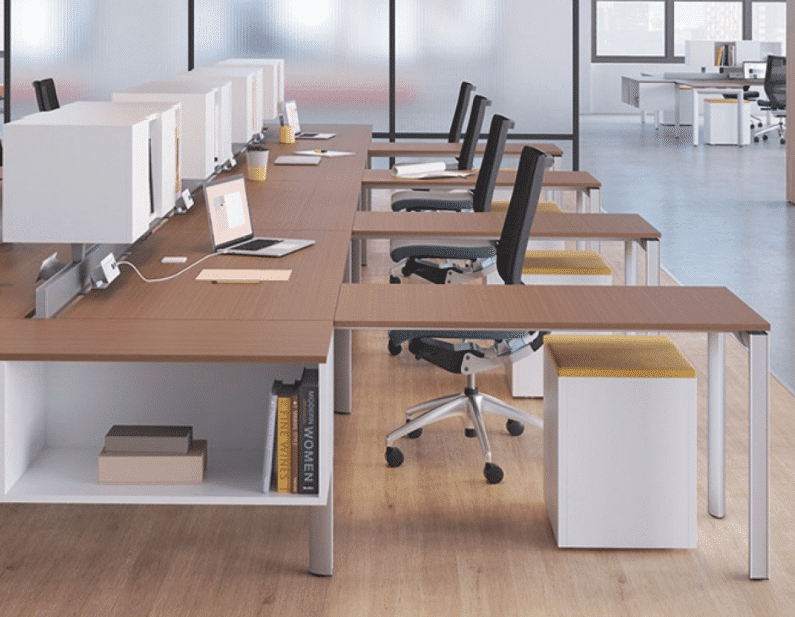We’ve met many, many business owners who have struggled to purchase furniture in one way or another.

Here are some of the most common pitfalls for small business owners in particular to avoid:
1. Buying Without A Vision Or Plan
Accurately Assess Your Needs: For example, think about how an item will be used. If it is a chair, will it be used occasionally, like a guest chair? If it is a task chair, is it ergonomic? Will it be moved or stationary? The more you assess, the greater chances you will get what you need.
Analyze What’s Good And Bad About What You Currently Have: Poll your employees that utilize the items on a daily basis, ask for their input. Are the chairs difficult to adjust? Do employees need a desk with a keyboard?
2. Not Considering Employee Comfort
Comfort equals productivity! We have all heard the saying, “Happy wife, Happy life”, now translate that to the work environment. Ergonomic design is critical to the comfort and productivity of your staff. Also, this can help minimize work related injuries and lost workdays which equals savings to your worker’s compensation and medical insurance.
3. Selecting Wrong Fabrics
Consider the purpose- meaning, will it be used in a space for examinations or breaks? A heavy duty vinyl that can withstand bleach type cleaners is best. Will it be utilized in a high traffic area? Durable engineered fabrics that are treated to resist stains, moisture and bacteria would be the better option. Mesh has gained popularity in task chairs as it allows airflow to the skin, keeping it cool and comfortable.
4. Getting Product That Is Not Rated For The Task
If we were all had the same build and body type, buying furniture would be a lot easier! In the real world, we need to accommodate individuals of all shapes and sizes. Choosing incorrectly rated items can result in costly damages to the product and more importantly, injury to your employee. Any savings you would realize with a lower rated product would be far exceeded by the cost of liability and replacements.
5. Choosing Price Over Value
Of course everyone loves a bargain! Make sure you give equal weight to value – consider the cost of ownership over the expected life of the furniture. Repairs and replacements could easily cancel any initial savings and possibly make the product more costly over time.
6. Not Buying With Future Growth In Mind
Consider How Furniture Will Adapt To Technology: As our climate continues to grow and change, so should your perspective on your needs. It is important to think about space, storage, power and how you will accommodate this.
Keep Your Workspace Flexible: It is a good idea to select furniture that can be easily moved and reconfigured as new needs arise. This provides the opportunity to keep your floor plan flexible. Do you need collaborative space for groups to work in teams? Touchdown areas for employees on the go? Benching for projects and larger projects?
7. Not Coordinating The Product’s Life Expectancy With Your Accounting Departments Depreciation Schedule
If your accounting department depreciates furniture over a 10 year period of time, yet you purchase items with a 5 year warranty, you might be forced to replace them sooner than your budget will allow. End result- your purchasing needs rapidly grow out of sync with your company’s accounting practices.
8. Not Evaluating The True Cost Of Ownership
The base price of furniture is the starting point. You need to know all of the “add on’s”- are there freight charges, taxes, special handling fees and services such as assembly and installation. Be sure to also compare and review compare warranties. It is important to know exactly what is covered and for how long.
9. Not Asking Your Dealer To Keep Your Office Standards On File
Once you have established specs and standards, the next time you order, it is much easier and more time effective to be able to call your dealer and ask for a task chair, knowing they have the fabrics, finishes and item numbers on file. This will help ensure that the new product matches your current furniture and will save you valuable time.
10. Doing Business With A Vendor That Offers Little Or No Support After The Sale
Most dealers will be attentive to your needs during the sales process, but what happens afterwards? Knowing your concerns, needs and questions will be addressed long after installation is paramount.



I need to get new furniture for my office. Thanks for your tip to make sure we aren’t choosing price over value. I’ll have to look for a good office furniture supplier to make sure we get the best stuff.
The insider’s guide to buying office furniture in this blog post provides valuable tips for creating a functional and stylish workspace. It’s a helpful resource for anyone looking to furnish their office with quality furniture that meets their needs. Thanks for sharing this informative guide!